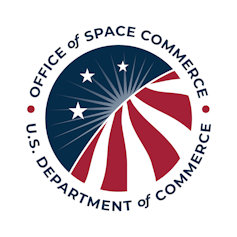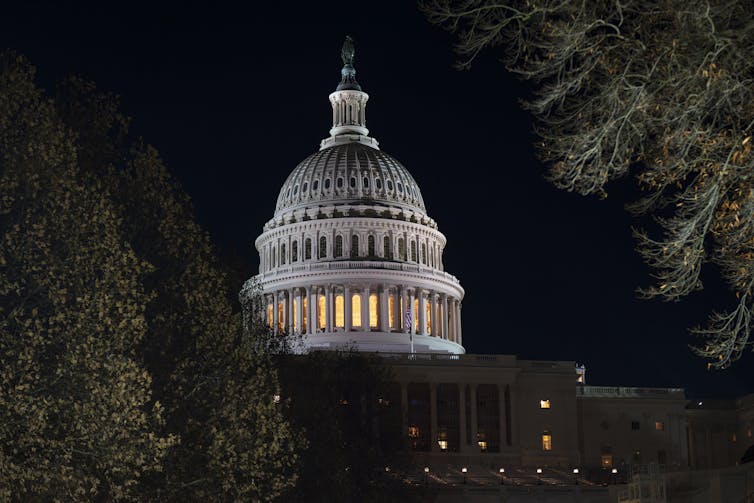
When I imagine the future of space commerce, the first image that comes to mind is a farmer’s market on the International Space Station. This doesn’t exist yet, but space commerce is a growing industry. The Space Foundation, a nonprofit organization for education and advocacy of space, estimates that the global space economy rose to US$613 billion in 2024, up nearly 8% from 2023, and 250 times larger than all business at farmer’s markets in the United States. This number includes launch vehicles, satellite hardware, and services provided by these space-based assets, such as satellite phone or internet connection.
Companies involved in spaceflight have been around since the start of the Space Age. By the 1980s, corporate space activity was gaining traction. President Ronald Reagan saw the need for a federal agency to oversee and guide this industry and created the Office of Space Commerce, or OSC.

So, what exactly does this office do and why is it important?
As a space scientist, I am interested in how the U.S. regulates commercial activities in space. In addition, I teach a course on space policy. In class, we talk about the OSC and its role in the wider regulatory landscape affecting commercial use of outer space.
The OSC’s focus areas
The Office of Space Commerce, an office of about 50 people, exists within the Department of Commerce’s National Oceanic and Atmospheric Administration. To paraphrase its mission statement, its chief purpose is to enable a robust U.S. commercial interest in outer space.
OSC has three main focus areas. First, it is the office responsible for licensing and monitoring how private U.S. companies collect and distribute orbit-based images of Earth. There are many companies launching satellites with special cameras to look back down at the Earth these days. Companies offer a variety of data products and services from such imagery – for instance, to improve agricultural land use.
A second primary job of OSC is space advocacy. OSC works with the other U.S. government agencies that also have jurisdiction over commercial use of outer space to make the regulatory environment easier. This includes working with the Federal Aviation Administration on launch licensing, the Federal Communications Commission on radio wavelength usage and the Environmental Protection Agency on rules about the hazardous chemicals in rocket fuel.
This job also includes coordinating with other countries that allow companies to launch satellites, collect data in orbit and offer space-based services.
In 2024, for example, the OSC helped revise the U.S. Export Administration Regulations, one of the main documents restricting the shipping of advanced technologies out of the country. This change removed some limitations, allowing American companies to export certain types of spacecraft to three countries: Australia, Canada and the United Kingdom.
The OSC also coordinates commercial satellites’ flight paths in near-Earth space, which is its third and largest function. The Department of Defense keeps track of thousands of objects in outer space and issues alerts when the probability of a collision gets high. In 2018, President Donald Trump issued Space Policy Directive-3, which included tasking OSC to take this role over for nongovernment satellites – that is, those owned by companies, not NASA or the military. The Department od Defense wants out of the job of traffic management involving privately owned satellites, and Trump’s directive in 2018 started the process of handing off this task to OSC.

To prevent satellites from colliding, OSC has been developing the traffic coordination system for space, known as TraCSS. It went into beta testing in 2024 and has some of the companies with the largest commercial constellations – such as SpaceX’s Starlink – participating. Progress on this has been slower than anticipated, though, and an audit in 2024 revealed that the plan is way behind schedule and perhaps still years away.
Elevating OSC
Deep in the text of Trump’s Aug. 13, 2025, executive order called Enabling Competition in the Commercial Space Industry, there’s a directive to elevate OSC to report directly to the office of the secretary of commerce. This would make OSC equivalent to its current overseer, NOAA, with respect to importance and priority within the Department of Commerce. It would give OSC higher stature in setting more of the rules regarding commercial use of space, and it would make space commerce more visible across the broader economy.
So, why did Trump include this line about elevating OSC in his Aug. 13 executive order?

Back in 2018, Trump issued Space Policy Directive-2 during his first term, which included a task to create the Space Policy Advancing Commerce Enterprise Administration, or SPACE. SPACE would have been an entity reporting directly to the secretary of commerce. While it was proposed as a bill in the House of Representatives later that year, it never became law.
The Aug. 13 executive order essentially directs the Department of Commerce to make this move now. Should the secretary of commerce enact the order, it would bypass the role of Congress in promoting OSC. The 60-day window that Trump placed in the executive order for making this change has closed, but with the government shutdown it is unclear whether the elevation of OSC might still occur.
Troubles for OSC
While all of this sounds good for promoting space as a place for commercial activity, OSC has been under stress in 2025. In February, the Department of Government Efficiency targeted NOAA for cuts, including firing eight people from OSC. Because about half of the people working in OSC are contractors, this represented a 30% reduction of force.

In March, Trump’s presidential budget request for the 2026 fiscal year proposed a cut of 85% of the $65 million annual budget of OSC. In July, space industry leaders urged Congress to restore funding to OSC.
The Aug. 13 executive order appeared to be good news for OSC. On Sept. 9, however, Bloomberg reported that the Department of Commerce requested a 40% rescission to OSC’s fiscal year 2025 budget.
Rescissions are “clawbacks” of funds already approved and appropriated by Congress. The promised funding is essentially put on hold. Once proposed by the president, rescissions have to be voted on by both chambers of Congress to be enacted. This must occur within 45 days, or before the end of the fiscal year, which was Sept. 30.
This rescission request came so close to that deadline that Congress did not act to stop it. As a result, OSC lost this funding. The loss could mean additional cutbacks to staff and perhaps even a shrinking of its focus areas.
Will OSC be elevated? Will OSC be restructured or even dismantled? The future is still uncertain for this office.![]()
Michael Liemohn, Professor of Climate and Space Sciences and Engineering, University of Michigan
This article is republished from The Conversation under a Creative Commons license. Read the original article.

 How to resolve AdBlock issue?
How to resolve AdBlock issue? 






































